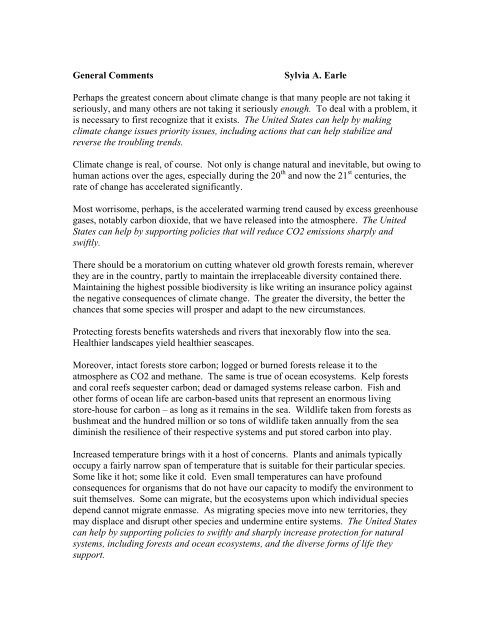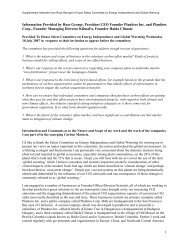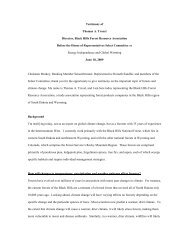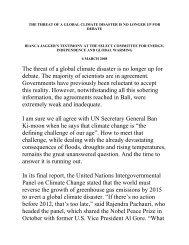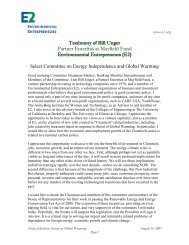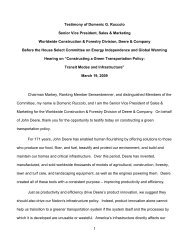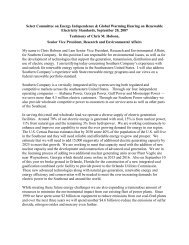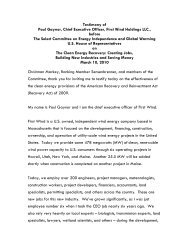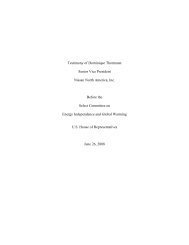Sylvia Earle - The Select Committee for Energy Independence and ...
Sylvia Earle - The Select Committee for Energy Independence and ...
Sylvia Earle - The Select Committee for Energy Independence and ...
You also want an ePaper? Increase the reach of your titles
YUMPU automatically turns print PDFs into web optimized ePapers that Google loves.
General Comments <strong>Sylvia</strong> A. <strong>Earle</strong><br />
Perhaps the greatest concern about climate change is that many people are not taking it<br />
seriously, <strong>and</strong> many others are not taking it seriously enough. To deal with a problem, it<br />
is necessary to first recognize that it exists. <strong>The</strong> United States can help by making<br />
climate change issues priority issues, including actions that can help stabilize <strong>and</strong><br />
reverse the troubling trends.<br />
Climate change is real, of course. Not only is change natural <strong>and</strong> inevitable, but owing to<br />
human actions over the ages, especially during the 20 th <strong>and</strong> now the 21 st centuries, the<br />
rate of change has accelerated significantly.<br />
Most worrisome, perhaps, is the accelerated warming trend caused by excess greenhouse<br />
gases, notably carbon dioxide, that we have released into the atmosphere. <strong>The</strong> United<br />
States can help by supporting policies that will reduce CO2 emissions sharply <strong>and</strong><br />
swiftly.<br />
<strong>The</strong>re should be a moratorium on cutting whatever old growth <strong>for</strong>ests remain, wherever<br />
they are in the country, partly to maintain the irreplaceable diversity contained there.<br />
Maintaining the highest possible biodiversity is like writing an insurance policy against<br />
the negative consequences of climate change. <strong>The</strong> greater the diversity, the better the<br />
chances that some species will prosper <strong>and</strong> adapt to the new circumstances.<br />
Protecting <strong>for</strong>ests benefits watersheds <strong>and</strong> rivers that inexorably flow into the sea.<br />
Healthier l<strong>and</strong>scapes yield healthier seascapes.<br />
Moreover, intact <strong>for</strong>ests store carbon; logged or burned <strong>for</strong>ests release it to the<br />
atmosphere as CO2 <strong>and</strong> methane. <strong>The</strong> same is true of ocean ecosystems. Kelp <strong>for</strong>ests<br />
<strong>and</strong> coral reefs sequester carbon; dead or damaged systems release carbon. Fish <strong>and</strong><br />
other <strong>for</strong>ms of ocean life are carbon-based units that represent an enormous living<br />
store-house <strong>for</strong> carbon – as long as it remains in the sea. Wildlife taken from <strong>for</strong>ests as<br />
bushmeat <strong>and</strong> the hundred million or so tons of wildlife taken annually from the sea<br />
diminish the resilience of their respective systems <strong>and</strong> put stored carbon into play.<br />
Increased temperature brings with it a host of concerns. Plants <strong>and</strong> animals typically<br />
occupy a fairly narrow span of temperature that is suitable <strong>for</strong> their particular species.<br />
Some like it hot; some like it cold. Even small temperatures can have profound<br />
consequences <strong>for</strong> organisms that do not have our capacity to modify the environment to<br />
suit themselves. Some can migrate, but the ecosystems upon which individual species<br />
depend cannot migrate enmasse. As migrating species move into new territories, they<br />
may displace <strong>and</strong> disrupt other species <strong>and</strong> undermine entire systems. <strong>The</strong> United States<br />
can help by supporting policies to swiftly <strong>and</strong> sharply increase protection <strong>for</strong> natural<br />
systems, including <strong>for</strong>ests <strong>and</strong> ocean ecosystems, <strong>and</strong> the diverse <strong>for</strong>ms of life they<br />
support.


